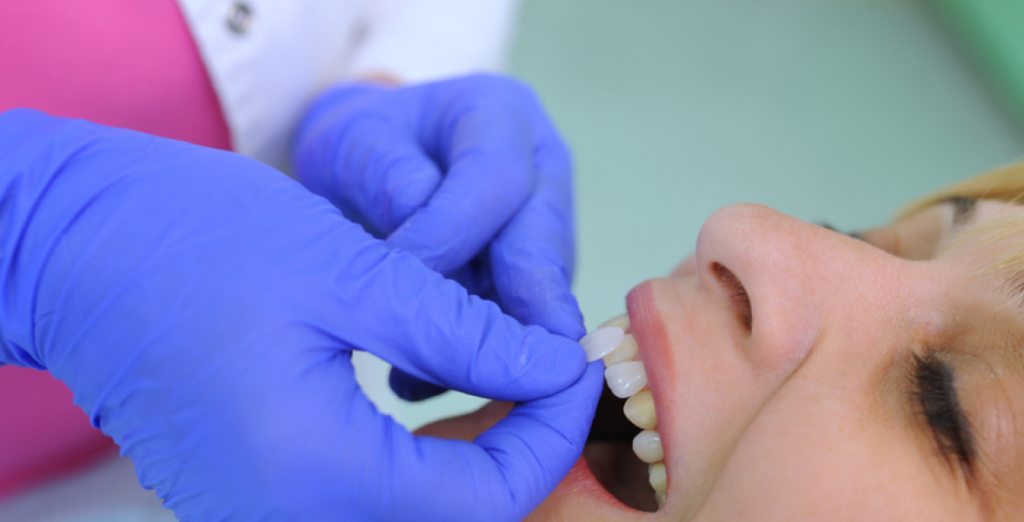This treatment is for you if…
You wish to have a film star smile for longer.
What are porcelain veneers teeth?
Porcelain veneers teeth, also known as teeth or aesthetic veneers, are a type of dental treatment that consists of sticking very fine sheets to teeth. Their main objective is to improve the aesthetic appearance of the patient’s mouth, correcting their shape, filling in holes between teeth, hiding fractures and structural damage or resolving problems of wear and tear, among others.
The porcelain veneers have a thickness of 0.2-1.2 mm, thereby ensuring comfort and a highly natural aspect. Hence, they are one of the most effective dental aesthetic treatments on the market, especially recommended for those people that are not satisfied with the appearance or the shape of their teeth.
Types of porcelain veneers teeth
There are three types of ceramic porcelain veneers teeth, which are distinguished by their characteristics and uses:

Ultra-thin
As the name itself indicates, they are thinner than the rest and, in turn, more resistant. In their manufacture, they use injected porcelain, which provides greater resistance than other types of porcelain veneers teeth. Thanks to their reduced thickness, they may be placed without the need to carve the tooth.
Zirconium
They are usually a lot thicker and more opaque than the ultra-thin veneers, and are only used in very specific cases.
Feldspar
They consist of sheets between 0.2 mm and 0.5 mm and provide much more aesthetic results. However, they are more fragile than the two previous types, hence they are generally indicated for patients that have slight anomalies.
Lithium disilicate
Lithium disilicate is a material that arises from a mixture of glass and ceramic. It is used to make crowns, veneers teeth and bridges, among others, It has been proven to last three times longer than other materials. Lithium disilicate is characterised by its easy handling, its high resistance and its cementation, allowing it to attach better to the dental tissue, thereby allowing a more lasting union.
Advantages of porcelain veneers
Porcelain veneers have a series of advantages for patients that have them fitted:
- They are harder than natural enamel. Furthermore, the treatment is much longer lasting, since they maintain the colour and shine of teeth on a permanent basis.
- It is a scantly invasive treatment that does not cause any type of pain or discomfort for the patient receiving it.
- Unlike other similar treatments, they do not become stained by substances such as cigarettes, coffee or tea.
- The characteristics of porcelain mean that veneers cannot be differentiated from natural teeth. Furthermore, they attach very strongly to dental enamel, so nobody can tell that you are wearing them.
- Generally, they do not require any subsequent maintenance or treatment beyond the oral care performed by everyone on a daily basis.
- They are extremely comfortable when eating or talking.
- There is a wide variety of options to choose from, so they are quite personalisable, based on the patient’s needs – they have a more voluminous shape and a much whiter tone.
- They last a lot longer than other veneers teeth. Hence, while composite veneers teeth last a maximum of approximately five years, porcelain veneers teeth may last around 10 or 15 years, if people look after them correctly.
- It is possible to combine the veneers teeth treatment with other previous dental treatments such as, for example, orthodontics.
Porcelain veneers teeth treatment phases
There are four phases in the placement of porcelain veneers teeth:
1. Aesthetic analysis and study model. The specialist meets with the patient in an initial session to carry out an in-depth study to analyse the teeth’s parameters. At the same appointment, the necessary treatment is agreed.
2. The specialist performs a mock-up or model so that the patient sees the approximate result of the treatment to be carried out. Hence, an idea can be made of the definitive shape of the teeth.
3. Preparation of the teeth, for which a virtual or conventional mould is taken on which the porcelain veneers will be worked. In this phase, the tooth is prepared on the outside, simply polishing its imperfections and rounding off angles. Following the taking of conventional or digital impressions, they are sent for manufacture by the laboratory, in line with the professional’s instructions, and provisional veneers teeth are fitted during the manufacture process to protect the teeth following their carving.
4. In this last phase, the provisional veneers teeth are removed and the definitive ceramic veneers teeth are cemented.
Prices
The amounts indicated have been estimated in line with a full treatment, in accordance with the parameters in the table. Includes: study, treatment and check-ups during the treatment, so it serves as a guide and is of a merely informative non-contractual nature. The personalised treatment will be examined in line with the medical prescription. Prices can be increased if additional costs are incurred as a result of the requests made by each customer. Price valid until 31 December 2024 except in the event of a typing error.

